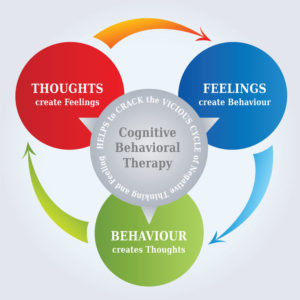 Overview
Overview
Cognitive Behavioral Therapy (CBT) is the strongest, research-backed therapeutic approach in the treatment of anxiety and, additionally, to be very effective for a whole host of other mental health issues. It is based on the framework that emotions, thoughts, and body sensations/physical behavior are at three points of a triangle and intervening on one of the points will result in changes the other two.
TEDx Talk: Feeling Good presented by David Burns, MD – In this YouTube video, David Burns, MD, a well known researcher, clinician, and educator introduces the power of CBT in his warm, humorous and down-to-earth way.
Concepts
“Automatic Thoughts”
Automatic thoughts are a core concept of CBT. They are our brain’s running interior dialogue or self-talk that narrates our life without us even really being aware of that it’s happening until we choose to pay attention to them. If your thoughts frequently contain “thought errors” that are biased to being negative ones, they are very likely to be increasing the level of anxiety or depression that you feel necessarily . These thoughts are habits that reflect the way we interpret things that we do, experience, or even how we view the world. The thing about habits is that, with some work, they can be shifted or changed. When you increase awareness of what your automatic thoughts are, you can start to challenge them and then, ultimately, reduce their effect on your perceptions and your mood. When working with children, negative automatic thoughts that affect them this can sometimes be referred to as a “brain bully.”
- An animated video that talks about automatic thoughts and gives an overview of some of the typical “thought errors” that people might have. Read More >
Thought Errors/Cognitive Distortions
“Focus on the Negative”
Focusing on the negative is known in CBT as a cognitive distortion or “thought error” that can increase the level of anxiety or depression that you feel. The human brain is drawn to negatives but it skews our perception of people and the world around us. With the easy access to negativity in the media, including the internet, it can be more and more challenging to pull our minds away and, instead, choose to focus on the wealth of positive things in our lives. However, the research shows that with practice we can get better at recognizing when we are focusing on only the negative aspects of something and then consciously remind ourselves of all of the positives in the situation instead.
- A playful animated video that illustrates this idea. Read More >
- TED talk that gives a more scientific explanation of how our brains seem to stay stuck on negative information, and how to get unstuck. Read More >
- Story time! At least that’s what our brain is doing when we are experiencing fear for something that might happen in the future. Check out this TED talk and learn more. Hmmm…why might this knowledge be important? Read More >
